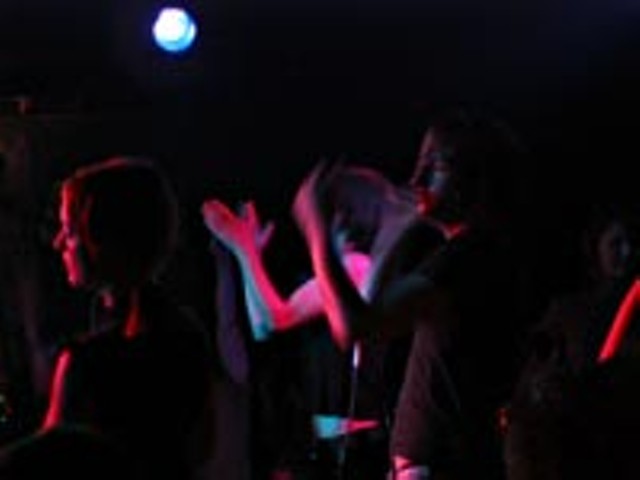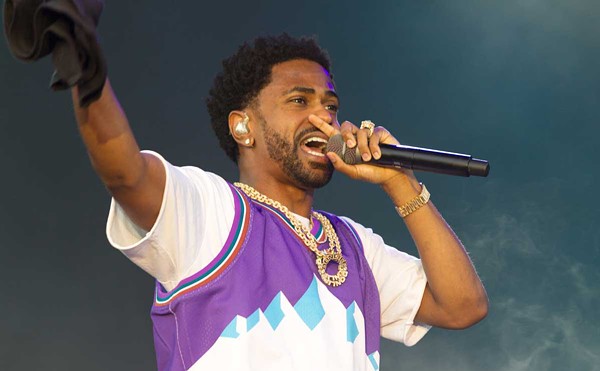Jazz is an ever-curious time machine. Fueled by the past, it discovers the future in the always-unfolding present. Though awed by their forebears, jazz players keep finding new directions in the music when they improvise — and what gets discovered today sets up parameters to be revised tomorrow.
So the idea of a “new breed,” an influx of newcomers with fresh ideas, has taken on more importance in jazz than in most other forms. Yet bassist John Lindberg — now in his early 40s — was barely what you’d call a young lion when he first hit the scene. At 16, he was more like a cub.
“I was born in Royal Oak and my family moved out to Marshall, near Battle Creek, when I was 12,” he says on the phone from his home near Woodstock, N.Y. “I never really got involved in the Detroit music scene, but one of my first teachers was [saxophonist] Roscoe Mitchell who lived up the road from Marshall in a small town called Bath. I started going over to study, play and just hang out with him when I was 14 or 15. We never did any concerts, but at his house for a while we had a little group — two flute players and myself on bass — where we were playing written string-trio music. They’d be playing the high string parts and I’d play the cello part. And we got together and did a lot of informal playing outside the teaching relationship.”
Lindberg soon realized that his real education wasn’t going to take place in high school, so at 16 he headed for Woodstock where something called the Creative Music Studio was in full swing.
“At that time, it was the most vital educational opportunity for fledgling improvising musicians. It had an incredible faculty, including [bassist] Dave Holland, [vibraphonist] Karl Berger, [saxophonist] Sam Rivers and [cornetist] Don Cherry. I started to study privately with Dave, and took part in workshops with the others. For me they were an incredible mind-expanding experience, both conceptually and technically, especially at such an early age.
“We put together a quintet amongst the students and played every weekend at a little spot called the Horseman’s Lodge (laughs) around the corner from the Studio. Then we took that quintet down to Virginia where one of the guys had some connections, and we played a club regularly there for a while. When that dried up, I went with one of the other players to Kansas City, just following one lead after another. Eventually I ended up playing a long stint at the Miami Airport Inn with a singer and put together a little stake that let me move to New York City. A lot happened in just a couple of years.”
By the tender age of 18, Lindberg had already paid a busload of dues, having studied with some of the most brilliant avant-gardists in jazz and having made a go of it on the unforgiving road. So when he got to Manhattan, he was more than ready to make some waves. In 1977, he founded a project that would continue through 15 recordings and numerous incarnations, the String Trio of New York (one of two groups that he brings to Ann Arbor’s daring Edgefest this weekend).
“James Emery, the guitarist, and myself are original members, but we’re onto violinist No. 5 [currently Rob Thomas]. We’ve had a rotating violin chair — but over 25 years, five isn’t bad, I guess. Originally we were a composers’ collective, so our repertoire was all original music by the members, and that’s still a large part of what we do. Then we started to add original arrangements of classic jazz compositions by composers we really dug, like Charles Mingus, Thelonious Monk, Duke Ellington, Charlie Parker and Wayne Shorter. And then we started to commission contemporary living composers that we had relationships with to write for us, such as Dave Douglas, Joe Lovano, Muhal Richard Abrams, Mark Helias and Marty Ehrlich. Some of those pieces kind of hedge over into the contemporary classical world, but all of them involve improvisation. We’re playing American classical music.”
The enormous influence of jazz’s past on Lindberg becomes apparent when he talks about one of his heroes in particular, a bassist-composer he holds up as a kind of role model.
“I saw Mingus play twice in the same week at the Village Gate in New York. One of the performances was really a mess; the problems he was having at the end of his life were very apparent. But I came back a couple of nights later and he did an impeccable set, so my last vision of him in my mind is just beautiful. He’s really very important to me, on the level of being a bassist-composer who combined both worlds in such a total and seamless way. He’s really inspirational. Mingus is one of my favorite composers in any genre, and then he’s one of my favorite bass players — and when you put the two things together, he becomes this monster musical being.”
But it’s the second of Lindberg’s Edgefest groups, the intensely melodic John Lindberg Quartet, that more clearly illustrates his insatiable musical curiosity. Throughout his still-young career, he has played with a seemingly endless array of creative musicians: John Tchicai, Jimmy Lyons, Sunny Murray, Anthony Braxton, Steve Lacy, George Lewis, Hugh Ragin, Wadada Leo Smith, Larry Ochs, Andrew Cyrille and Bill Dixon, among many others. For the Edgefest edition of his intimately collaborative quartet, Lindberg brings together Michigan names Wendell Harrison (tenor sax and clarinet), Ed Sarath (flügelhorn) and Djallo Djakete Keita (drums), a group he jokingly calls the Michigan Horns.
“It’s something we’ve done a few times, although I’ve done a lot more with Wendell, playing as a duo. It’s a different side of what I do musically, mostly my own compositions and we might do some Mingus. I try to do things that feature individual personalities, and all these guys have really unique musical personalities. Ed and Wendell are just a great horn section, with an incredible rapport between them.”
On the near horizon, Lindberg’s new CD releases include a String Trio of New York set, called Gut Reaction (due in January), recorded live during three nights at the Jazz Standard in New York City. Then another side due at the end of the year, Powerful Reflections Upon Powerhouses, will be out under the name of John Lindberg’s World Star Quartet (featuring Baikida Carroll, trumpet; Steve Gorn, reeds; and Suzie Ibarra, drums). It’s a suite in homage to American classical composers Charles Ives and Louis Moreau Gottschalk. If that seems surprising, then you haven’t been paying attention — because John Lindberg reinvents himself (and the music) every day.
Check out the schedule for Edgefest 2002. George Tysh is the Metro Times arts editor. E-mail him at [email protected]





